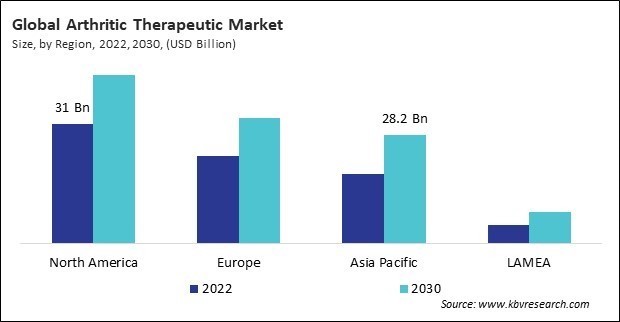According to a new report, published by KBV research, The Global Arthritic Therapeutic Market size is expected to reach $112.6 billion by 2030, rising at a market growth of 5.1% CAGR during the forecast period.
Adopting arthritic therapeutics is closely linked to the prevalence and severity of arthritis within a population. As the incidence of arthritis rises, driven by factors such as aging demographics, sedentary lifestyles, and increasing obesity rates, there is a corresponding increase in the demand for effective treatments. High prevalence rates, particularly among older adults, contribute to greater awareness and recognition of arthritis as a significant health concern, prompting healthcare providers to prioritize arthritis management and adopt evidence-based therapeutic approaches.

Arthritic therapeutics extend beyond pharmacological interventions to encompass multidisciplinary care approaches that address the multifaceted nature of arthritis. Comprehensive arthritis management involves collaboration among rheumatologists, orthopedic surgeons, primary care physicians, physical therapists, occupational therapists, psychologists, nutritionists, and other healthcare professionals. Patient education and self-management programs empower individuals with arthritis to actively participate in their care, adopt healthy lifestyle behaviors, adhere to treatment regimens, and make informed decisions about their health.
Arthritic therapeutics include preventive measures to reduce the risk of arthritis onset or progression, particularly in high-risk populations. Lifestyle modifications, like weight management, regular exercise, smoking cessation, and dietary interventions, help mitigate risk factors associated with arthritis, including obesity, sedentary behavior, and inflammation. Early detection and timely intervention through screening programs, genetic testing, and risk stratification enable healthcare providers to identify individuals at risk for arthritis and implement preventive strategies to delay disease onset or minimize its impact.
The Rheumatoid Arthritis segment is generating highest revenue in the Global Arthritic Therapeutic Market, by Application in 2022; thereby, achieving a market value of $63.7 Billion by 2030. The escalating global incidence of rheumatoid arthritis has led to a commensurate surge in the demand for therapeutic interventions aimed at symptom management and disease progression prevention. Individuals with RA require ongoing treatment and disease monitoring to control inflammation, prevent joint damage, and improve quality of life. This growing demand for arthritis therapies market growth and fosters innovation in drug development, treatment modalities, and healthcare delivery models.
The Disease Modified Anti-rheumatoid Drugs (DMARDs) segment is experiencing a CAGR of 5.5% during (2023 - 2030). DMARDs are specifically designed to modify the underlying disease process of rheumatoid arthritis and other autoimmune forms of arthritis. By targeting the immune system and inflammatory pathways, DMARDs help to suppress inflammation, prevent joint damage, and slow disease progression. This disease-modifying effect improves symptoms and helps preserve joint integrity and function over the long term, leading to better outcomes and reduced disability for individuals with arthritis.
Full Report: https://www.kbvresearch.com/arthritic-therapeutic-market/
The North America region dominated the Global Arthritic Therapeutic Market, by Region in 2022, and would continue to be a dominant market till 2030; thereby, achieving a market value of $43.7 Billion by 2030. The Europe region is anticipated to grow at a CAGR of 4.8% during (2023 - 2030). Additionally, The Asia Pacific region would witness a CAGR of 6% during (2023 - 2030).
By Application
By Product Type
 Unique Offerings
Unique Offerings